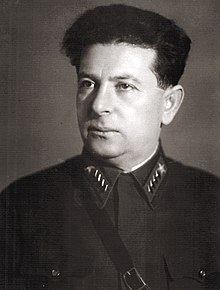Lev Mekhlis
Appearance

Lev Zakharovich Mekhlis (January 13, 1889 – February 13, 1953) was a Soviet politician and military leader, one of the main Stavka representatives during World War II who was responsible for five to seven Soviet fronts.
Quotes
[edit]- Dear Comrade Stalin. My nerves fail me. I can not act like a Bolshevik; I especially feel the pain of my words in our personal conversation. I offered you and the Party my whole life. I am absolutely devastated. We have been taken by many people in recent years.
- A fragment of a letter to Stalin by Mekhlis in 1938, after two years of constant purges of people. Quoted in Simon Sebag Montefiore, Stalin: Court of the Red Tsar.
- If a second imperialist war turns its cutting edge against the world's first socialist state, then it will be necessary for the Soviet Union to extend hostilities to the adversary's territory, fulfill its international responsibilities and increase the number of Soviet republics.
- Speech at the XVIII Congress of the All-Union Communist Party (Bolsheviks), 14 March 1939 - quoted in Albert L. Weeks, Stalin's Other War: Soviet Grand Strategy, 1939-1941
- War is an equation with many unknowns; and this already refutes the thesis of invincibility. History does not know invincible armies. The wars of the past show us that even armies that had won brilliant victories for decades, in some cases were not only defeated but even disintegrated and ceased to exist. Such a fate, for example, befell the army of Napoleon, who for almost two decades kept the whole Europe under its boots. The army needs to instill a spirit of confidence in its power, but not in terms of boasting. Bragging about invincibility brings harm to the army.
- Speech to Red Army personnel, 13 May 1940[1]
- Our war with the capitalist world will be a just and progressive war. The Red Army will act decisively, seeking complete defeat and destruction of the enemy, transferring combat operations to the territory of the enemy.
- Speech to Red Army personnel, 13 May 1940[2]
- Military history, especially Russian, is being studied poorly. We have a lot of unfair ridiculing of the old army despite the fact that we had such notable tsarist army generals as Suvorov, Kutuzov and Bagration who will always remain in the minds of the people as great Russian military leaders and who are revered in the Red Army as a legacy of the finest military traditions of the Russian soldier. There exists a harmful cult of Civil War heroes, while previous Russian military achievements are ignored. All of this leads to the ignoring of concrete historical experience despite the fact that history is the best teacher.
- Mekhlis in 1940. Quoted in The People Need a Tsar: The Emergence of National Bolshevism as Stalinist Ideology, 1931-1941, by D. L. Brandenberger & A. M. Dubrovsky, 1998
- Soldiers of the Red Army, fellow brothers who were captured by the fascist invaders, we are addressing you, compatriots... Run in groups and alone, make your way to your brotherly native family - the Red Army... We will greet you as brethren, freed from fascist captivity...
- From a leaflet written by Mekhlis in 1941[3]
Quotes about Mekhlis
[edit]- A shark has appeared and he wants to devour me. Either he devours me or I eat him. The latter is very unlikely.
- Marshal Vasily Blyukher describing Mekhlis to his wife, shortly before his [Blyukher's] arrest in 1938. Quoted in Simon Sebag Montefiore, Stalin: Court of the Red Tsar.
- The engagements in which Zhukov won his reputation were so massive that, inevitably, many outstanding Soviet military men were involved- either under Zhukov's command or in coordinated and associated movements. There was then, and there continued for years to be, a raging competition for military glory in these engagements. Deep lines of political cleavage and quarrels also underlay the military disputes. Not only military glory was involved; political intrigue, intra-Party quarrels, high-level Kremlin politics were at issue. The principal military rivals of Zhukov were his fellow marshals, Ivan S. Konev, Rodion Malinovsky, V. I. Chuikov, A. I. Yeremenko, Semyon Timonshenko, and to a lesser extent men like K. K. Rokossovsky, V. D. Sokolovsky, and the staff chiefs, A. M. Vasilevsky, Boris Shaposhnikov and, later on, S. M. Shtemenko. Rivals of a different category were Stalin's cronies, men like Voroshilov and Budenny, and police generals such as L. Z. Mekhlis and G. I. Kulik.
- Harrison E. Salisbury (editor), Introduction to Marshal Zhukov's Greatest Battles (New York: Harper & Row, 1969) by Georgy Zhukov, translated from Russian by Theodore Shabad, p. 14-15


